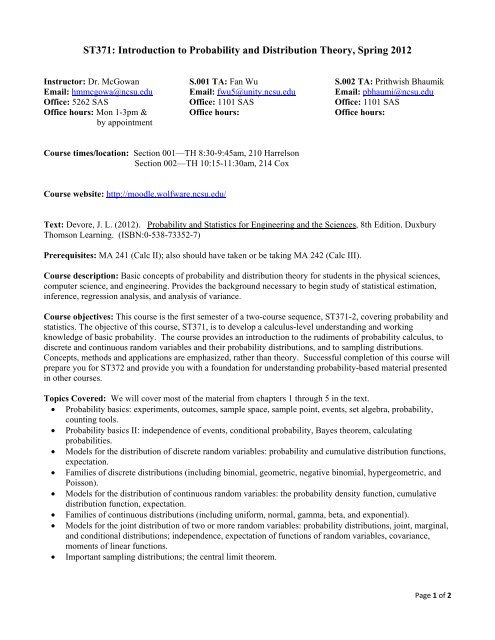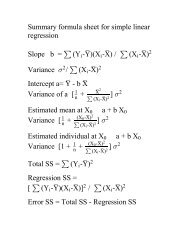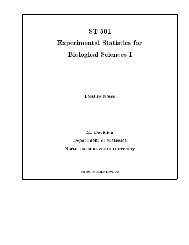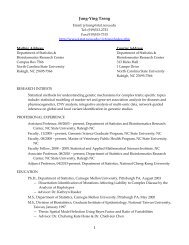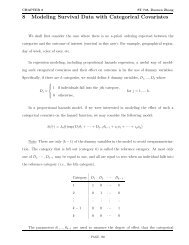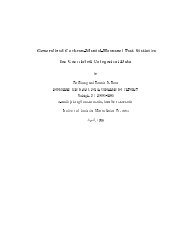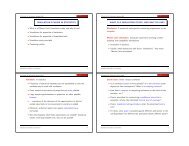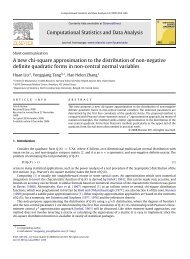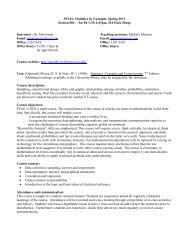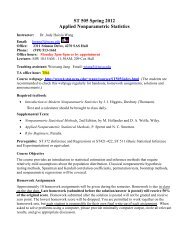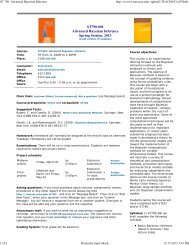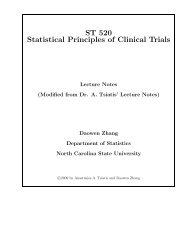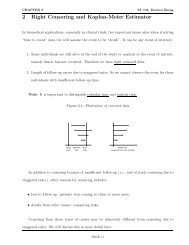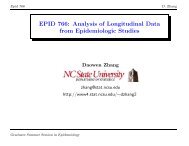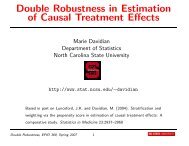ST371: Introduction to Probability and Distribution ... - NCSU Statistics
ST371: Introduction to Probability and Distribution ... - NCSU Statistics
ST371: Introduction to Probability and Distribution ... - NCSU Statistics
You also want an ePaper? Increase the reach of your titles
YUMPU automatically turns print PDFs into web optimized ePapers that Google loves.
<strong>ST371</strong>: <strong>Introduction</strong> <strong>to</strong> <strong>Probability</strong> <strong>and</strong> <strong>Distribution</strong> Theory, Spring 2012<br />
Instruc<strong>to</strong>r: Dr. McGowan<br />
Email: hmmcgowa@ncsu.edu<br />
Office: 5262 SAS<br />
Office hours: Mon 1-3pm &<br />
by appointment<br />
S.001 TA: Fan Wu<br />
Email: fwu5@unity.ncsu.edu<br />
Office: 1101 SAS<br />
Office hours:<br />
Course times/location: Section 001—TH 8:30-9:45am, 210 Harrelson<br />
Section 002—TH 10:15-11:30am, 214 Cox<br />
Course website: http://moodle.wolfware.ncsu.edu/<br />
S.002 TA: Prithwish Bhaumik<br />
Email: pbhaumi@ncsu.edu<br />
Office: 1101 SAS<br />
Office hours:<br />
Text: Devore, J. L. (2012). <strong>Probability</strong> <strong>and</strong> <strong>Statistics</strong> for Engineering <strong>and</strong> the Sciences, 8th Edition. Duxbury<br />
Thomson Learning. (ISBN:0-538-73352-7)<br />
Prerequisites: MA 241 (Calc II); also should have taken or be taking MA 242 (Calc III).<br />
Course description: Basic concepts of probability <strong>and</strong> distribution theory for students in the physical sciences,<br />
computer science, <strong>and</strong> engineering. Provides the background necessary <strong>to</strong> begin study of statistical estimation,<br />
inference, regression analysis, <strong>and</strong> analysis of variance.<br />
Course objectives: This course is the first semester of a two-course sequence, <strong>ST371</strong>-2, covering probability <strong>and</strong><br />
statistics. The objective of this course, <strong>ST371</strong>, is <strong>to</strong> develop a calculus-level underst<strong>and</strong>ing <strong>and</strong> working<br />
knowledge of basic probability. The course provides an introduction <strong>to</strong> the rudiments of probability calculus, <strong>to</strong><br />
discrete <strong>and</strong> continuous r<strong>and</strong>om variables <strong>and</strong> their probability distributions, <strong>and</strong> <strong>to</strong> sampling distributions.<br />
Concepts, methods <strong>and</strong> applications are emphasized, rather than theory. Successful completion of this course will<br />
prepare you for ST372 <strong>and</strong> provide you with a foundation for underst<strong>and</strong>ing probability-based material presented<br />
in other courses.<br />
Topics Covered: We will cover most of the material from chapters 1 through 5 in the text.<br />
� <strong>Probability</strong> basics: experiments, outcomes, sample space, sample point, events, set algebra, probability,<br />
counting <strong>to</strong>ols.<br />
� <strong>Probability</strong> basics II: independence of events, conditional probability, Bayes theorem, calculating<br />
probabilities.<br />
� Models for the distribution of discrete r<strong>and</strong>om variables: probability <strong>and</strong> cumulative distribution functions,<br />
expectation.<br />
� Families of discrete distributions (including binomial, geometric, negative binomial, hypergeometric, <strong>and</strong><br />
Poisson).<br />
� Models for the distribution of continuous r<strong>and</strong>om variables: the probability density function, cumulative<br />
distribution function, expectation.<br />
� Families of continuous distributions (including uniform, normal, gamma, beta, <strong>and</strong> exponential).<br />
� Models for the joint distribution of two or more r<strong>and</strong>om variables: probability distributions, joint, marginal,<br />
<strong>and</strong> conditional distributions; independence, expectation of functions of r<strong>and</strong>om variables, covariance,<br />
moments of linear functions.<br />
� Important sampling distributions; the central limit theorem.<br />
Page 1 of 2
Grading: Your final grade in this course will depend on the following<br />
Quizzes 100 points<br />
Midterm exam 100 points<br />
Final exam 200 points<br />
Total 400 points<br />
Grades will be determined by calculating the student’s percentage out of the available points <strong>and</strong> comparing with<br />
predetermined cu<strong>to</strong>ff points as follows:<br />
A+: 98%<br />
B+: 88%<br />
C+: 78%<br />
D+: 68%<br />
A: 92%<br />
B: 82%<br />
C: 72%<br />
D: 62%<br />
A-: 90%<br />
B-: 80%<br />
C-: 70%<br />
D-: 60%<br />
Percentage cu<strong>to</strong>ffs are firm <strong>and</strong> no rounding occurs. Incomplete (IN) grades are given only as specified in<br />
university regulations.<br />
Quizzes: There will be 5 quizzes throughout the semester, each worth 25 points. No make ups will be offered for<br />
the quizzes; however, the lowest quiz score will be dropped. Quizzes will occur on the following dates: January<br />
19, February 2, February 16, March 29, <strong>and</strong> April 19.<br />
Exams: The midterm is scheduled for March 1. The cumulative final exam will be held on May 3 from 8-11am<br />
for Section 002 <strong>and</strong> May 8 from 8-11am for Section 001.<br />
Students who are unable <strong>to</strong> attend an exam for a legitimate unavoidable reason may take a make-up exam only if<br />
the student provides suitable documentation (such as a physician’s note) of the absence. Students who have a<br />
personal emergency (extreme family illness or death, etc.) should contact the Division of Undergraduate<br />
Academic Programs (Park Shops, 515-3037) <strong>to</strong> obtain documentation. According <strong>to</strong> university policy, a student<br />
must notify the instruc<strong>to</strong>r in advance if s/he will miss an exam. If it is not possible <strong>to</strong> notify the instruc<strong>to</strong>r in<br />
advance, the instruc<strong>to</strong>r must be given notice as soon as possible after the exam.<br />
Policies for quizzes <strong>and</strong> exams:<br />
� All quizzes <strong>and</strong> exams will be closed book.<br />
� Students are allowed one 8½ by 11 inch sheet of notes (both sides, any content).<br />
� Students should bring a calcula<strong>to</strong>r. Students may NOT share calcula<strong>to</strong>rs during quizzes <strong>and</strong> exams.<br />
� All cell phones, PDAs <strong>and</strong> any web-enabled devices must be turned off <strong>and</strong> put away during quizzes <strong>and</strong><br />
exams; these devices can NOT be used as calcula<strong>to</strong>rs or time keeping devices.<br />
� Students may NOT leave the room <strong>and</strong> return for any reason during quizzes <strong>and</strong> exams.<br />
Policy on academic integrity: Copying someone else's work <strong>and</strong> presenting it as your own is plagiarism.<br />
Plagiarism, cheating, <strong>and</strong> other forms of academic dishonesty will not be <strong>to</strong>lerated. To create a fair <strong>and</strong> equitable<br />
environment the instruc<strong>to</strong>r aggressively enforces the universities policies on academic misconduct. All cases of<br />
academic misconduct will be h<strong>and</strong>led as set out in university policies. For additional information see<br />
http://www.ncsu.edu/policies/student_services/student_conduct/POL445.00.1.htm.<br />
Students with disabilities: Reasonable accommodations will be made for students with verifiable disabilities.<br />
Any student who feels they may need an accommodation based on the impact of a disability should contact the<br />
instruc<strong>to</strong>r privately <strong>to</strong> discuss your specific needs. In order <strong>to</strong> take advantage of available accommodations,<br />
students must register with Disability Services for Students at 1900 Student Health Center, Campus Box 7509,<br />
515-7653. http://www.ncsu.edu/provost/offices/affirm_action/dss/. For more information on NC State's policy on<br />
working with students with disabilities, please see<br />
http://www.ncsu.edu/policies/academic_affairs/pols_regs/REG205.00.28.php.<br />
Page 2 of 2


